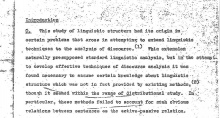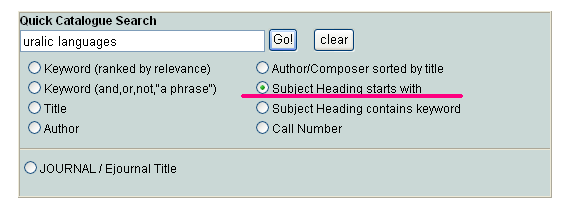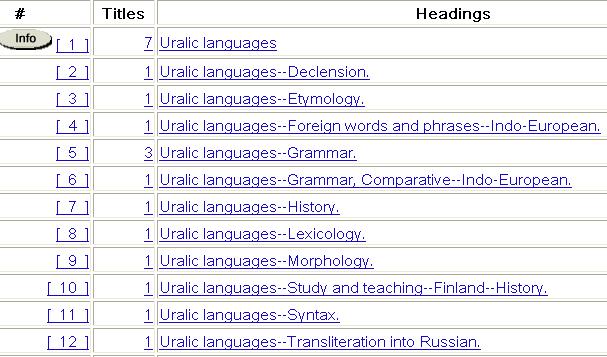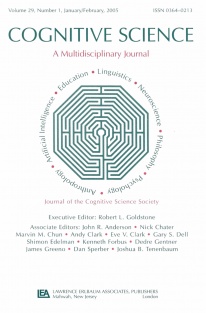April 26th, 2007 by Susan Atkey | No Comments »

Dr. Robert Berwick and his Computation Linguistics Research group at MIT have digitized a microfilm copy of the marked-up version of Noam Chomsky’s complete thesis draft (1955-56) “The Logical Structure of Linguistic Theory”.
With Chomsky’s permission, the entire file is downloadable at http://alpha-leonis.lids.mit.edu/chomsky/.
This is the copy Chomsky was preparing for publication as ”The Logical Structure of Linguistic Theory”. It contains Chomsky’s hand-written annotations and several chapters and appendices that were left out of the published version of ”The Logical Structure of Linguistic Theory”, including an information-theoretic method to construct linguistic categories that Chomsky developed in conjunction with Peter Elias.
The Logical Structure of Linguistic Theory was published by University of Chicago Press in 1975; we have two copies in Koerner at P158 .C5 1975.
UBC students and faculty also have access to the electronic copy of Chomsky’s 1955 Ph.D dissertation “Transformational Analysis” (which contain a few chapters from this document) through the Proquest Dissertations and Theses database.
Posted in Publishing, Syntax | No Comments »
April 18th, 2007 by Susan Atkey | No Comments »
Do you dread public speaking? Tomorrow’s Library Workshop on “Polishing Your Presentation” may be the first step in overcoming that fear and improving your presentation skills for that upcoming thesis defense.
Polishing Your Presentation
Learn the essential components of public speaking: content preparation, verbal and non-verbal performance as well as ways to manage anxiety. A good presentation is a strong communication tool; discover the skills you need to enhance your personal performance.
Thursday, April 19 from 12:00 – 1:00 PM
Koerner Library : Room 216 (show me a map)
Sign up here.
Part of the Graduate Student Workshop Series.
Posted in Workshops and Tutorials | No Comments »
April 16th, 2007 by Susan Atkey | No Comments »

If you are interested in the Inuktitut language or oral traditions, you may want to see the upcoming screening of Atanarjuat: The Fast Runner at the Vancouver International Film Centre.
Atanarjuat is based on an ancient Inuit legend which takes place in the area around Igloolik. The film is in the Inuktitut language (with English subtitles).
Details:
Vancouver International Film Centre (Vancity Theatre)
1181 Seymour Street (corner Davie Street)
April 19, 2007 at 7:30 pm
http://www.academy.ca/events/screenclassics07.cfm
You may also wish to check out these books on the Inuktitut language at UBC Library:
From magic words to word processing : a history of the Inuit language by Louis-Jacques Dorais.
Inuit languages and dialects = Inuit uqausiqatigiit by Louis-Jacques Dorais.
Learning to speak Inuktitut : a grammar of North Baffin dialects by Alex Spalding
Inuktitut : a multi-dialectal outline dictionary by Alex Spalding & Thomas Kusugaq.
For more, browse the Subject Headings Inuktitut language or Inuit language in the library catalogue.
Posted in Uncategorized | No Comments »
April 13th, 2007 by Susan Atkey | No Comments »
The word of the today, Friday April 13, is:
Paraskavedekatriaphobia
Dr. Language at YourDictionary.com defines Paraskavedekatriaphobia as “The Fear of Friday the Thirteenth, a form of triskaidekaphobia, the fear of the number thirteen.”
Usage: The fear of Friday the 13th originated in two fears: the fear of Friday and the fear of the number “13.” Why? Well, no one knows so we won’t repeat any of the urban myths that have arisen to explain either. The fear of 13 is clearly much greater than the fear of Friday, since the 13th floor is regularly omitted from high-rise buildings, 13th Street and 13th Avenue are often omitted in street numbering, and no one would dare invite 13 guests to sit around the table for dinner–at least one would surely die within a year.
Suggested Usage: Most people fear this word more than breaking a mirror while walking under a ladder to avoid a black cat on Friday 13th. It is long but pronounceable with a little practice: “Paraskavedekatriaphobia is among the leading causes of loss of productivity since many sufferers avoid coming to work on that day.” For the adjective, just replace the final [a] with a [c], “Freemont is an old paraskavedekatriaphobic who never leaves the house on Friday the 13th.”
Etymology: Today’s word is a humorous concoction that no Greek would ever utter. It seems to be based on the Greek word for Friday “paraskeue” + dekatria “thirteen” (deka “ten” + tria “three;” not “thirteenth,” which is “dekatreis”) + fobos “fear” + ia, a noun suffix. “Friday the Thirteenth” in Modern Greek is “Paraskeue kai dekatreis.” If you are worried today, we thought you might like to know that your worry has a name.
From: Dr. Language, YourDictionary.com
Posted in In the News | No Comments »
April 12th, 2007 by Susan Atkey | No Comments »
The final exam period runs from April 16-30 – check the Student Services portal for a list of Linguistics exam times and locations.
Did you know that the AMS has an exam database with final exams from a variety of undergraduate and graduate courses? Studying from these examples can be an excellent way to prepare and supplement your course knowledge. Select LING from the dropdown menu on the AMS Exam Database website to see what is available for Linguistics exams.
Good luck to all on your finals!
Posted in LING Courses, Tips and Tricks | No Comments »
April 12th, 2007 by Susan Atkey | No Comments »

(Photo: Library graphics)
Both Koerner and Woodward libraries will be open extended hours during the exam period from April 15-29.
Koerner’s extended hours:
Monday – Friday: 8am – 1am
Saturday, Sunday: 10am -1am
Woodward’s extended hours:
Monday – Thursday: 8am – 12midnight
Friday: 8am – 6pm
Saturday: 10am – 6pm
Sunday: 12noon – 12midnight
Posted in At the Library | No Comments »
April 3rd, 2007 by Susan Atkey | No Comments »
If you ever use Wikipedia as a resource for linguistics, you may be interested in a challenge currently going on over at the LINGUIST List.
Inspired by a letter sent by Barbara Partee regarding the coordinated efforts of a group of Russian linguists to improve linguistics coverage in the Russian-language Wikipedia, the LINGUIST has started a mini-funding drive to support a half-time LINGUIST staffer to coordinate similar efforts in the English-language Wikipedia.
The LINGUIST List would act as a hub and facilitator by calling for volunteers, coordinating efforts, identifying Wikipedia pages that need to be created or updated, and ensuring accuracy and consistency across the entries. As Wikipedia is a massively popular source of information, this would benefit Linguistics as a whole.
To read more about this effort, visit:
http://www.linguistlist.org/donation/fund-drive2007/wikipedia/
Posted in Electronic Resources, In the News | No Comments »
March 22nd, 2007 by Susan Atkey | No Comments »
For students in Linguistics 319 (Comparative and Historical Linguistics) who are searching for books and articles on a specific language family for your annotated bibliography, here are some tips for finding resources.
The handbooks on different language families in the Reference section of Koerner Library (2nd floor) are a good starting point. We have handbooks on these language families:
The Dravidian Languages
Handbook of North American Indians. Vol. 17, Languages
The Indo-European languages
The Uralic languages
To find books on your language family, use the UBC Library catalogue. Try a Subject Heading search for your language family name. Remember to select the option “Subject Heading” instead of the default “keyword”.

You will then see list of Subject headings, along with the number of books we have on that subject (to the left of the Heading). Click a Subject heading to see a list of books and location.

Clicking on “Uralic Languages”, the first link, will turn up 7 books, including:
Uralic language family : facts, myths and statistics by Angela Marcantonio
Uralic languages, edited by Daniel Abondolo.
Uralic languages : description, history, and foreign influences, edited by Denis Sinor.
To find journal articles, you’ll need to take a slightly different approach. We don’t list the contents of each single journal in the library catalogue. The catalogue only lists the titles of the journals, not the contents of each individual issue. To find articles on your topic, you’ll need to use an article index. Then you can check the library catalogue to see if we subscribe to that journal.
The best source for Linguistics articles is an index called Linguistic and Language Behavior Abstracts (LLBA). This index, along with over 600 others on various topics, can be found in the A-Z list of indexes and databases.
Once you’ve entered the LLBA index, do a search for your language family. The index will return a list of citations that contain your search terms. To find a copy of the article at UBC Library, click the UBCeLink icon and it will search the catalogue for a copy of the journal.
Posted in Uncategorized | No Comments »
March 20th, 2007 by Susan Atkey | No Comments »

A reminder about the upcoming library workshop on RefWorks this Thursday:
RefWorks is a web-based citation management tool, sponsored by the UBC Library, and available free-of-charge to current UBC faculty, staff, and students.
In this hands-on workshop you will create your own personal database in RefWorks, learn how to add references, and use these references when writing a paper, automatically formatting your footnotes and bibliography in the citation style of your choice.
We’ll focus on indexes, databases, and citation styles used by scholars in the Arts.
WHERE and WHEN?
Thursday, March 22 2007 from 1:00 PM – 3:00 PM
Koerner Library : Room 217 (show me a map)
Sign up here.
Posted in At the Library | No Comments »
February 27th, 2007 by Susan Atkey | No Comments »
 UBC Library now has online access to the ejournal Cognitive Science: A Multidisciplinary Journal.
UBC Library now has online access to the ejournal Cognitive Science: A Multidisciplinary Journal.
This is the official journal of the Cognitive Science Society, whose researchers hold a common goal: understanding the nature of the human mind. The Society promotes scientific interchange among researchers in disciplines comprising the field of Cognitive Science, including Artificial Intelligence, Linguistics, Anthropology, Psychology, Neuroscience, Philosophy, and Education.
Check out their list of top 10 classics from the journal (along with pdf versions of the papers.)
The top paper? Mental models in cognitive science by P.N. Johnson-Laird (1980). Click the link below to read the abstract.Abstract:
This article postulates that mental models differ from visual images and from propositional representations, and it presents evidence that corroborates the differences. It argues that reasoners use propositional representations of, say, spatial descriptions to construct mental models. It also argues that mental models rather than formal logic underlie syllogistic inference, e.g., some of the parents are drivers, all of the drivers are scientists, therefore, some of the parents are scientists. The article was the first in a journal to present a case for mental models as the end result of comprehension and as the starting point of deductive reasoning. This idea led to many subsequent investigations (see the mental models Website).
Posted in Journals | No Comments »






 UBC Library now has online access to the ejournal
UBC Library now has online access to the ejournal 